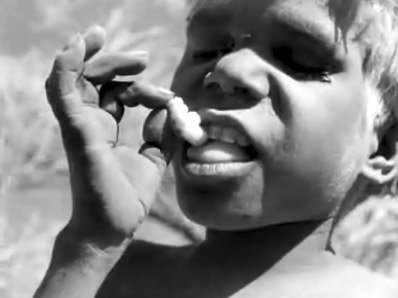|
Anthropology in the News
|
|
||||||||||||||||||||||||||||||||||
 "Palermo,Sicily Italy |
 A Fistfull of Rice Nepal |
 Claire Kathleen Roufs U.S.A. |
 "Eating Rat At The New Year" Vietnam National Geographic |
 Desert People Australia |
Extra
Credit Opportunities: Extra Credit Options
(1) . . . by doing a case study (short term paper) and / or (2) . . . by writing a review of a public lecture or by doing a film / lecture / event review on an optional qualifying film or lecture presentation
Due Dates and Handy Assignment Calculator from the UMD Library |
Extra Credit Case Study Option Extra credit Case Study papers allow you to cover an additional course topic in a more comprehensive fashion.
|
Extra credit term papers Instructions and Supporting Information
fs2025 Wk 13 (optional) Extra Credit Paper(s)
AVISO: Late Extra Credit Papers will not be accepted unless (1) arrangements for an alternate date have been arranged in advance, or (2) medical emergencies or similar extraordinary unexpected circumstances make it unfeasible to turn in the assignment by the announced due date. Why?
|
This course is governed by the . . .
University of Minnesota Duluth Student Academic Integrity Policy Use of AI-content generators for assignments in this class When I taught Advanced Writing for the Social Sciences here at UMD, for over twenty-five years, my rule of thumb advice to students was to plan to spend 60% or more of their time and effort revising drafts (for academic type writing). In 2001 Wikipedia appeared on the scene and very quickly became a useful tool as a starting point for many academic projects even though as an open-source resource the Wikipedia entries are not checked and verified in the same manner as other traditional reference materials. Spelling and grammar checkers arrived on the general scene and helped with spelling and grammar checking, but, as you no doubt have discovered, they continue to require human editing. And, of course, before that we had a selection of excellent Encyclopedia offering good starting points for many projects, the most popular being The Encyclopedia Brittanica. And long before that there were libraries--since at least the days of Alexandria in Egypt, in the third century B.C. The bottom line . . .
Today the evolution of research resources and aids continues with the relatively rapid appearance of ChatGPT and other automated content generators. As many folks have already found out, they can be very useful as starting points, much like their predecessors. But, from the academic point of view, they are still only starting points.
Professors nationwide are for the most part advised, and even encouraged, to experiment with the potentials of ChatGPT and similar apps. In this class it is fine to experiment, with the caveat that all of your written academic work demonstrates that your personal efforts—including content development and revision—reflect your personal originality, exploration, analysis, explanation, integrating and synthesizing of ideas, organizational skills, evaluation, and overall learning and critical thinking efforts. That is to say you may experiment with the AI tool to do tasks such as e.g, brainstorming, narrowing topics, writing first drafts, editing text, and the like. AI-generated works should in no case be more than that. In the end you need to become familiar enough with the various subjects, peoples, and places discussed in this class to research a topic and problem-solve on your own, and carry on an intelligent conversation about them in modern-day society . . . a conversation that goes byond your voicing an unsupported opinion. USEFUL LINKS FOR MORE INFORMATION: From Jill Jenson, Director of the Academic Writing & Learning Center For the record, what follows is the official UMD Academic Integrity Policy. Note that "unless otherwise noted by the faculty
member" this is the default policy. "UMD’s Academic Integrity policy covers any work done by automated content generators such as ChatGPT or other generative artificial intelligence tools unless otherwise noted by the faculty
member. These tools present new challenges and opportunities."
and the UMD Student Conduct Code The instructor will enforce and students are expected to follow the University's Student Conduct Code [http://www1.umn.edu/regents/policies/academic/Student_Conduct_Code.html] Instructor and Student Responsibilities Policy AVISO! Failure to comply with the above codes and standards when submitting an Extra Credit paper will result in a penalty commensurate with the lapse, up to and including an F final grade for the course, and, at a minimum, a reduction in total points no fewer than the points available for the Extra Credit project. The penalty will not simply be a zero for the project, and the incident will be reported to the UMD Academic Integrity Officer in the Office of Student and Community Standards.
A Note on "Cutting and Pasting" without the Use of Quotation Marks If you use others' words and/or works you MUST so indicate that with the use of quotation marks. Failure to use quotation marks to indicate that the materials are not of your authorship constitutes plagiarism—even if you have a citation to the source elsewhere in your paper/work. Patterned failure to so indicate that the materials are not of your own authorship will result in an F grade for the course. Other instances of improper attribution will result in a 0 (zero) for the assignment (or a reduction in points equal to the value of an Extra Credit paper), and a reduction of one grade in the final grade of the course. All incidents will be reported to the UMD Academic Integrity Officer in the Office of Student and Community Standards as is required by University Policy. |
|
 Page URL: http:// www.d.umn.edu /cla/faculty/troufs/anthfood/afextracredit_cs.html Site Information |
||
View Stats |
|